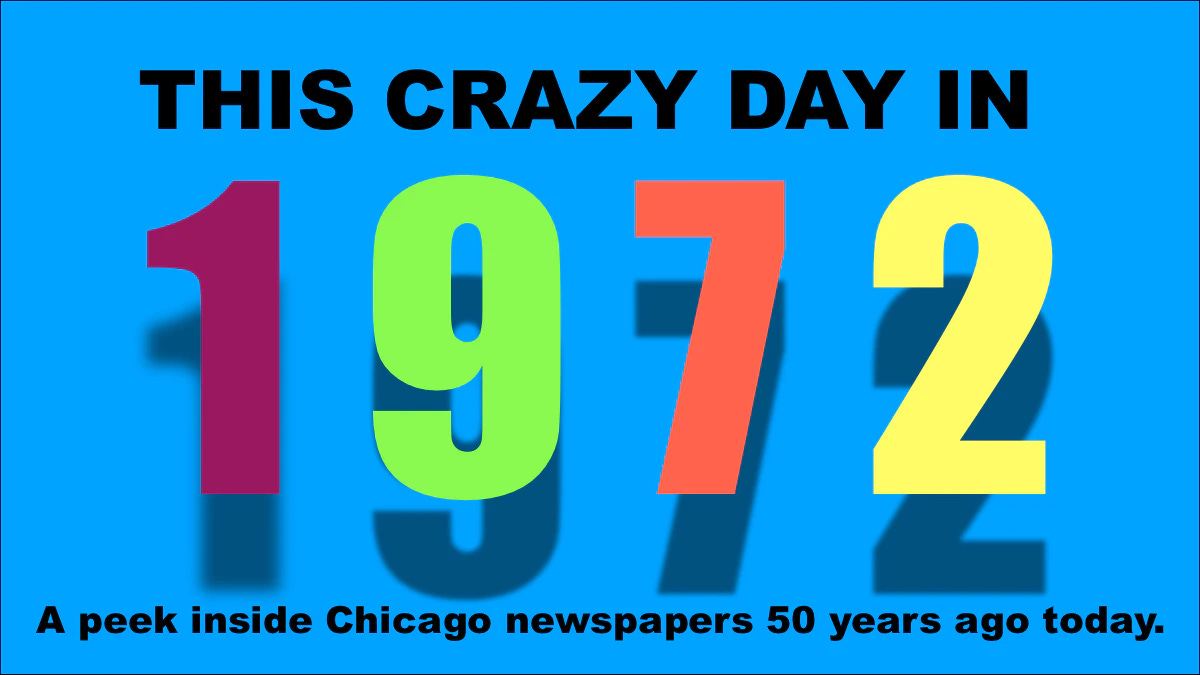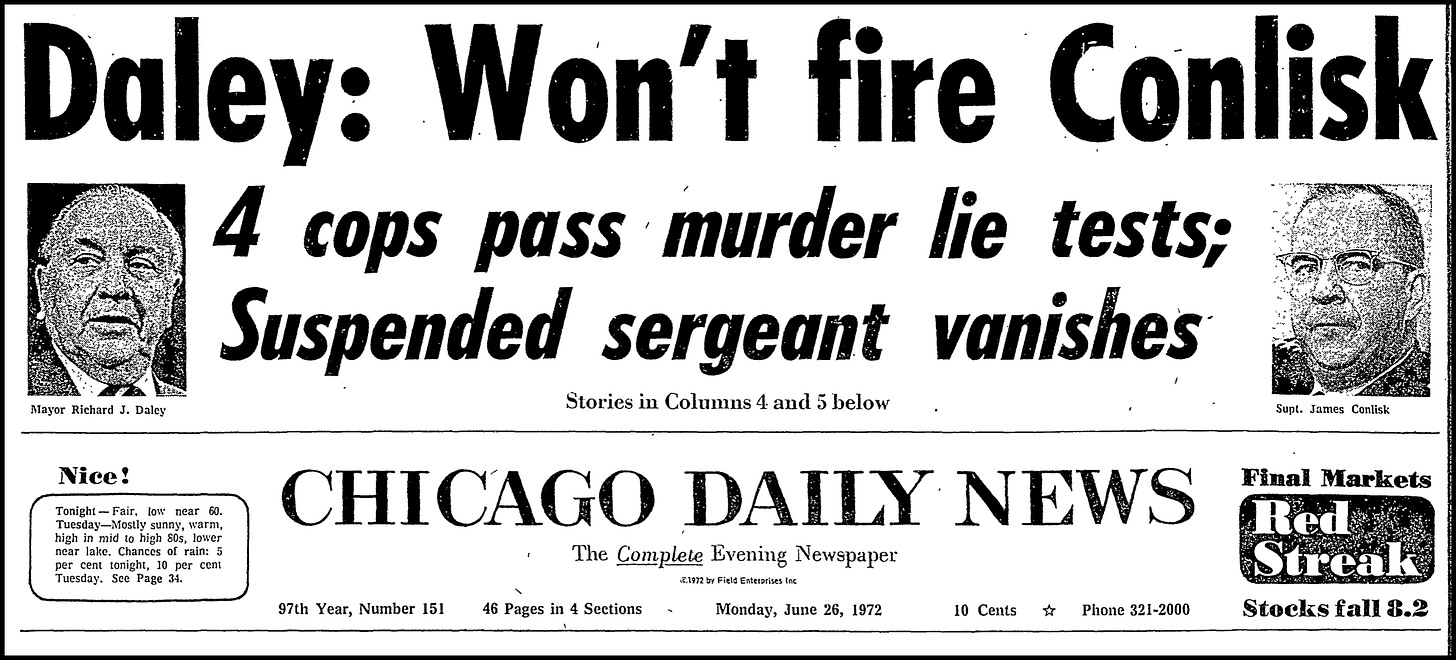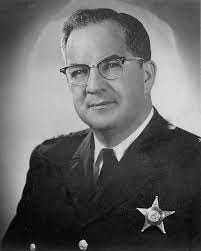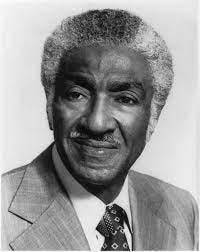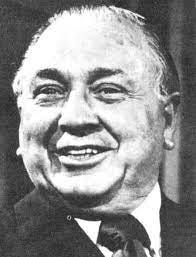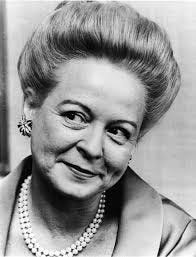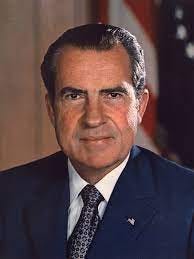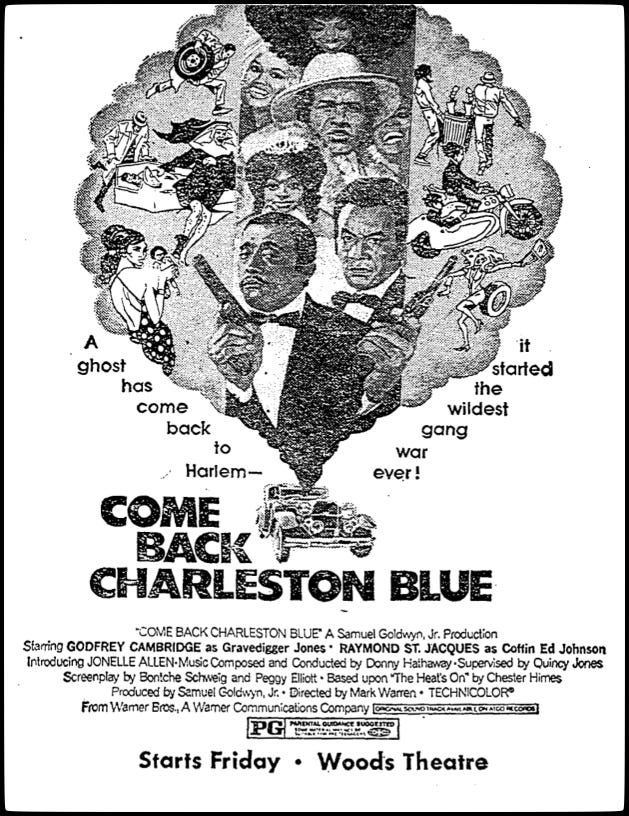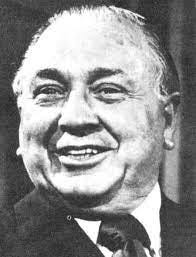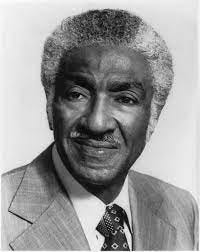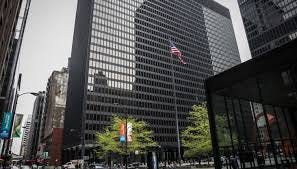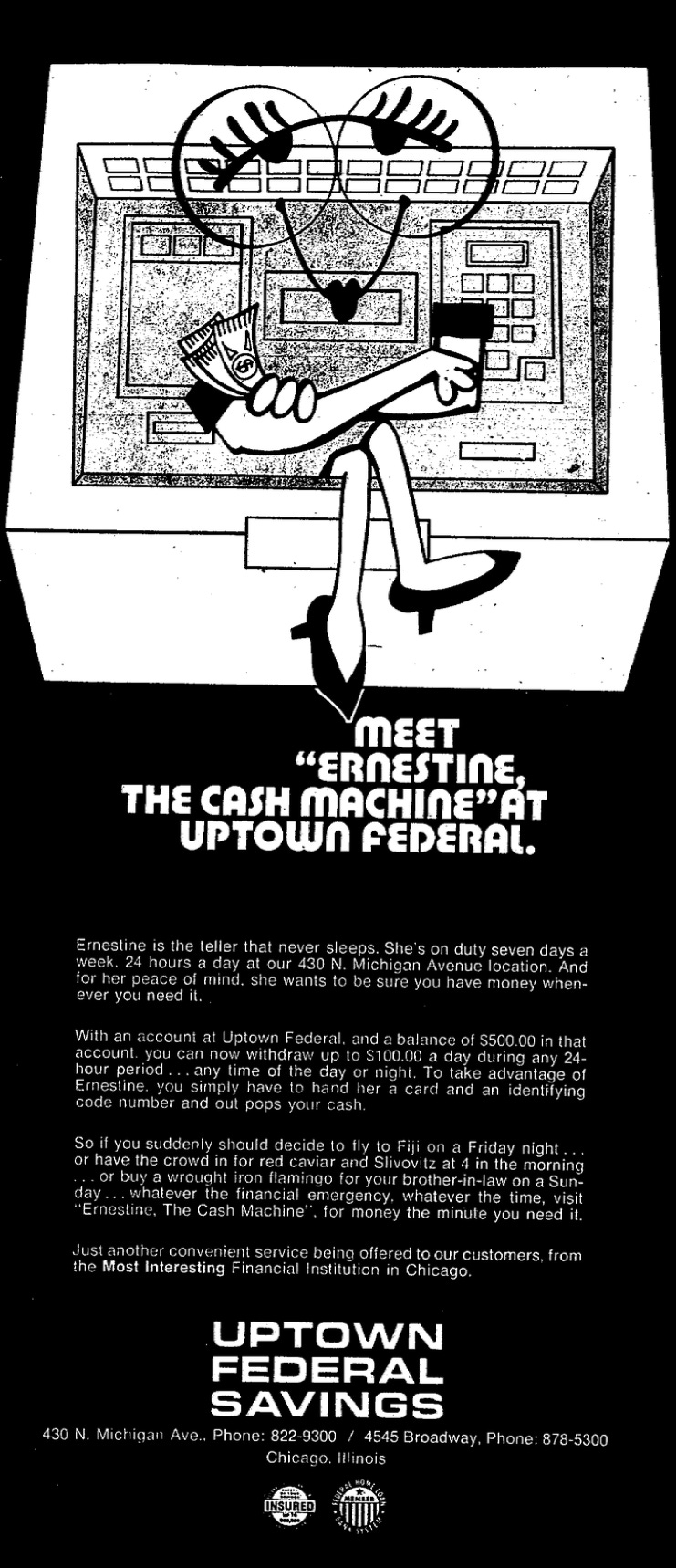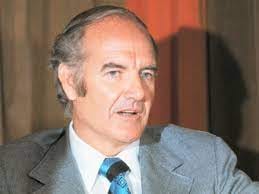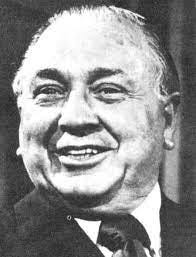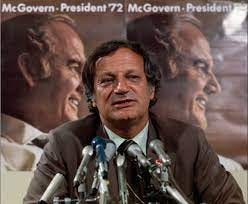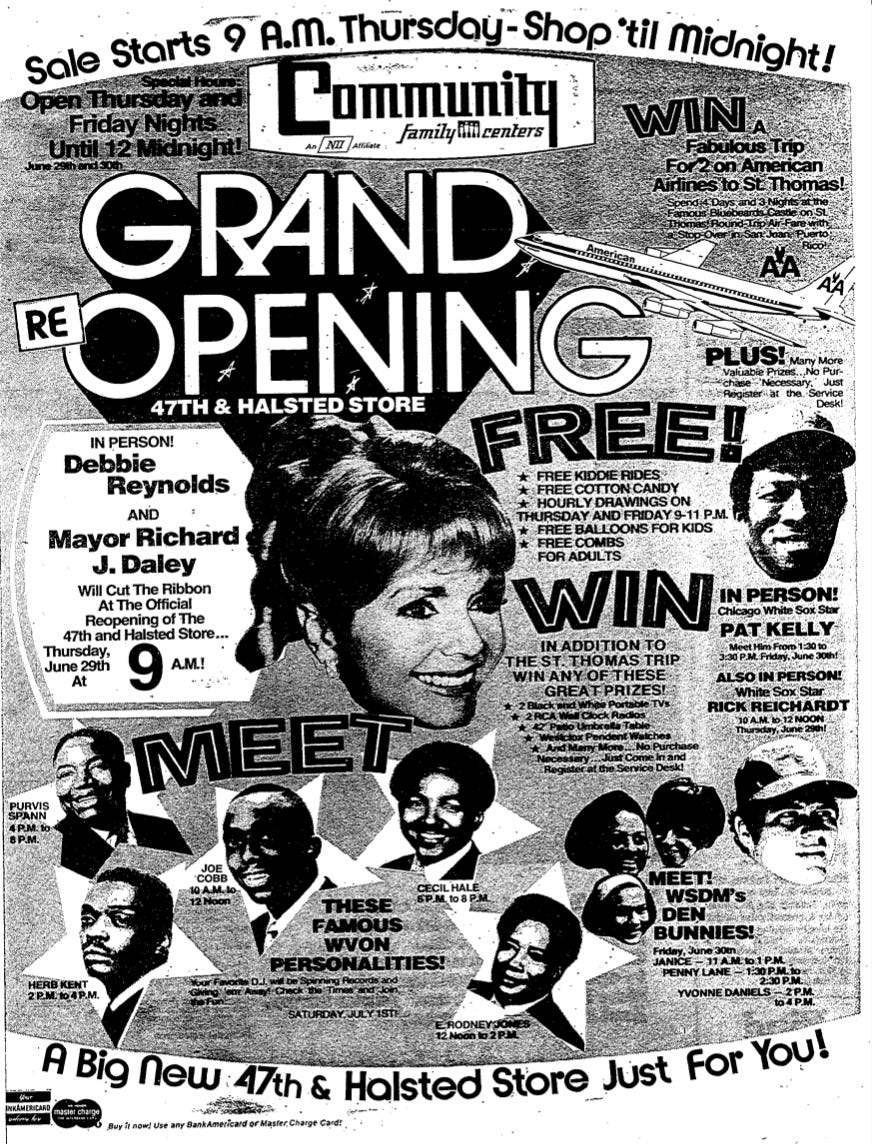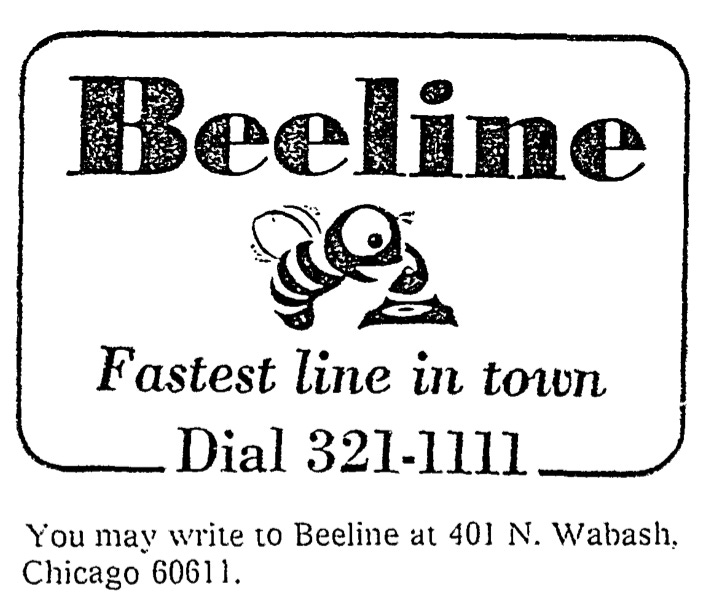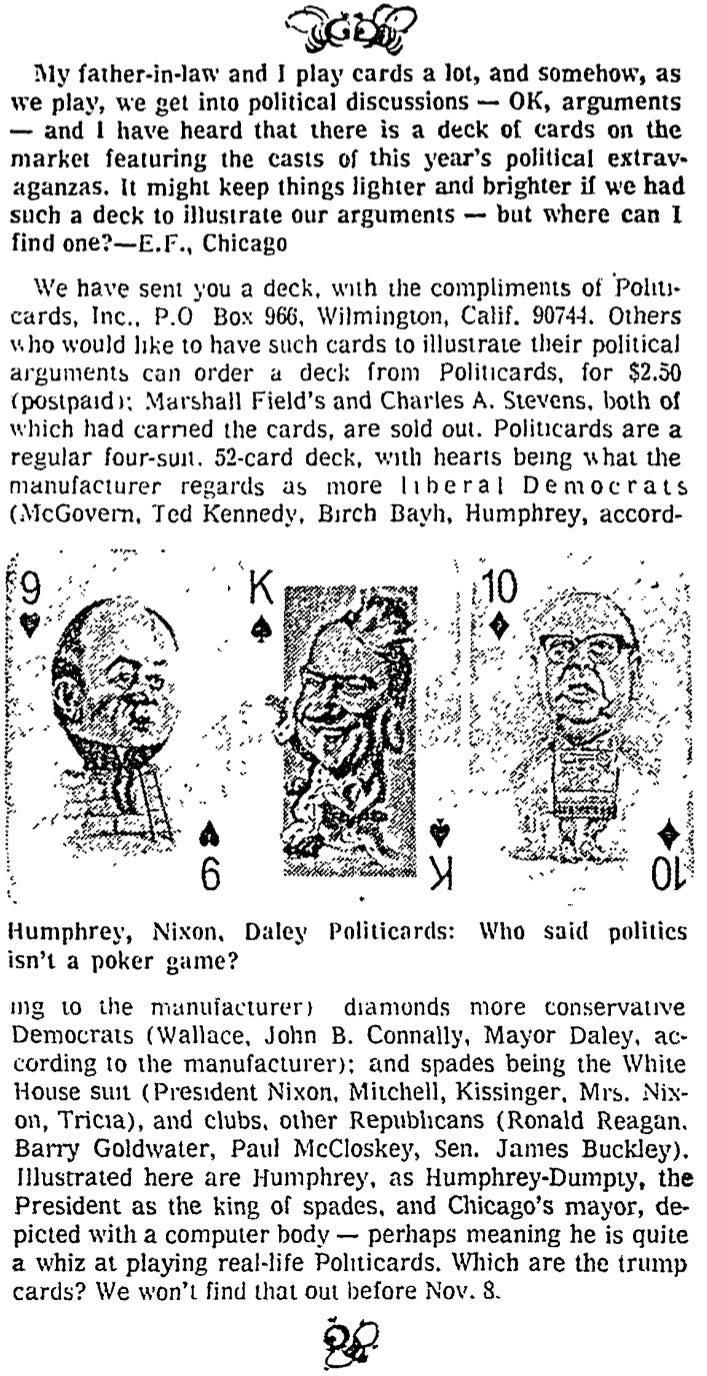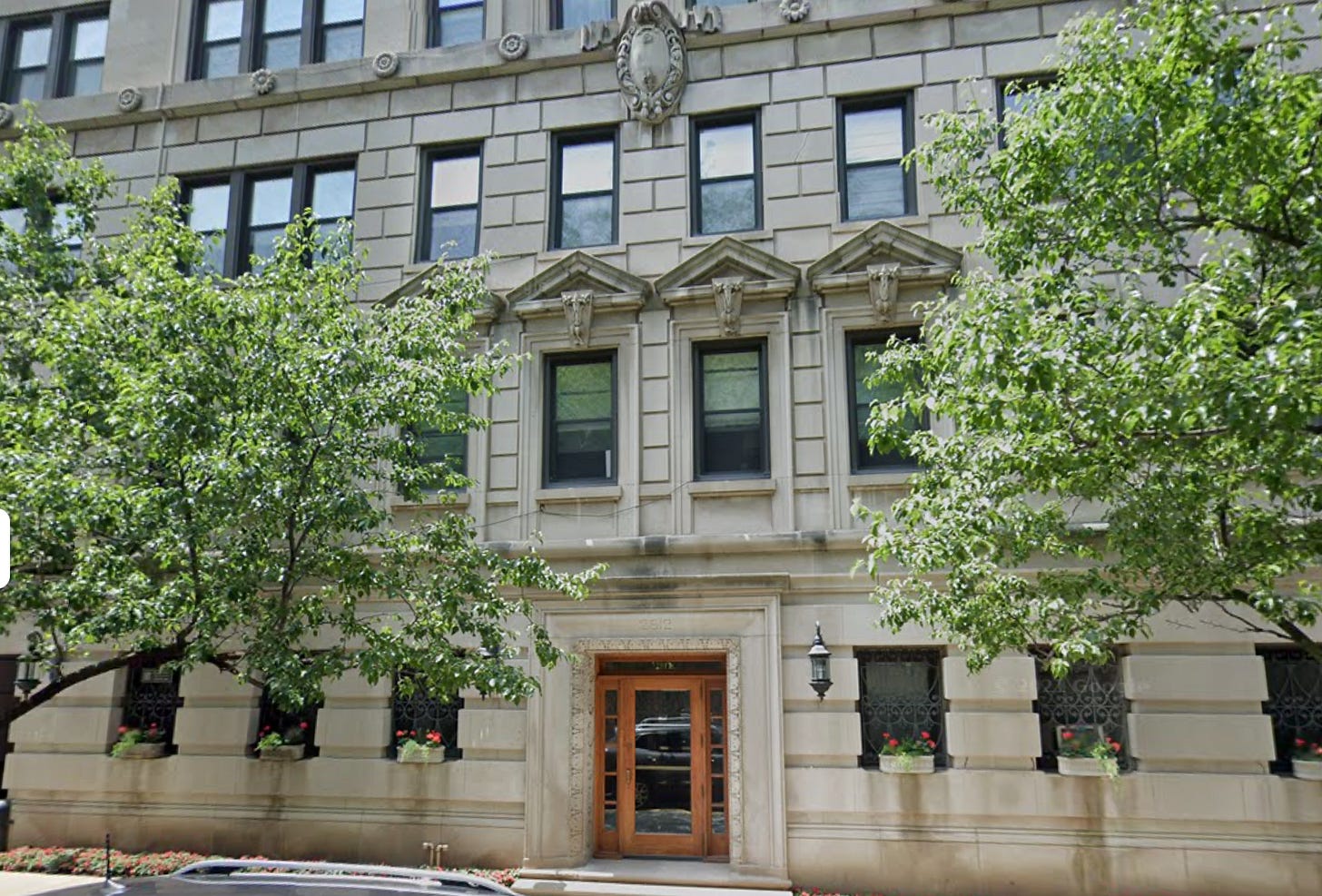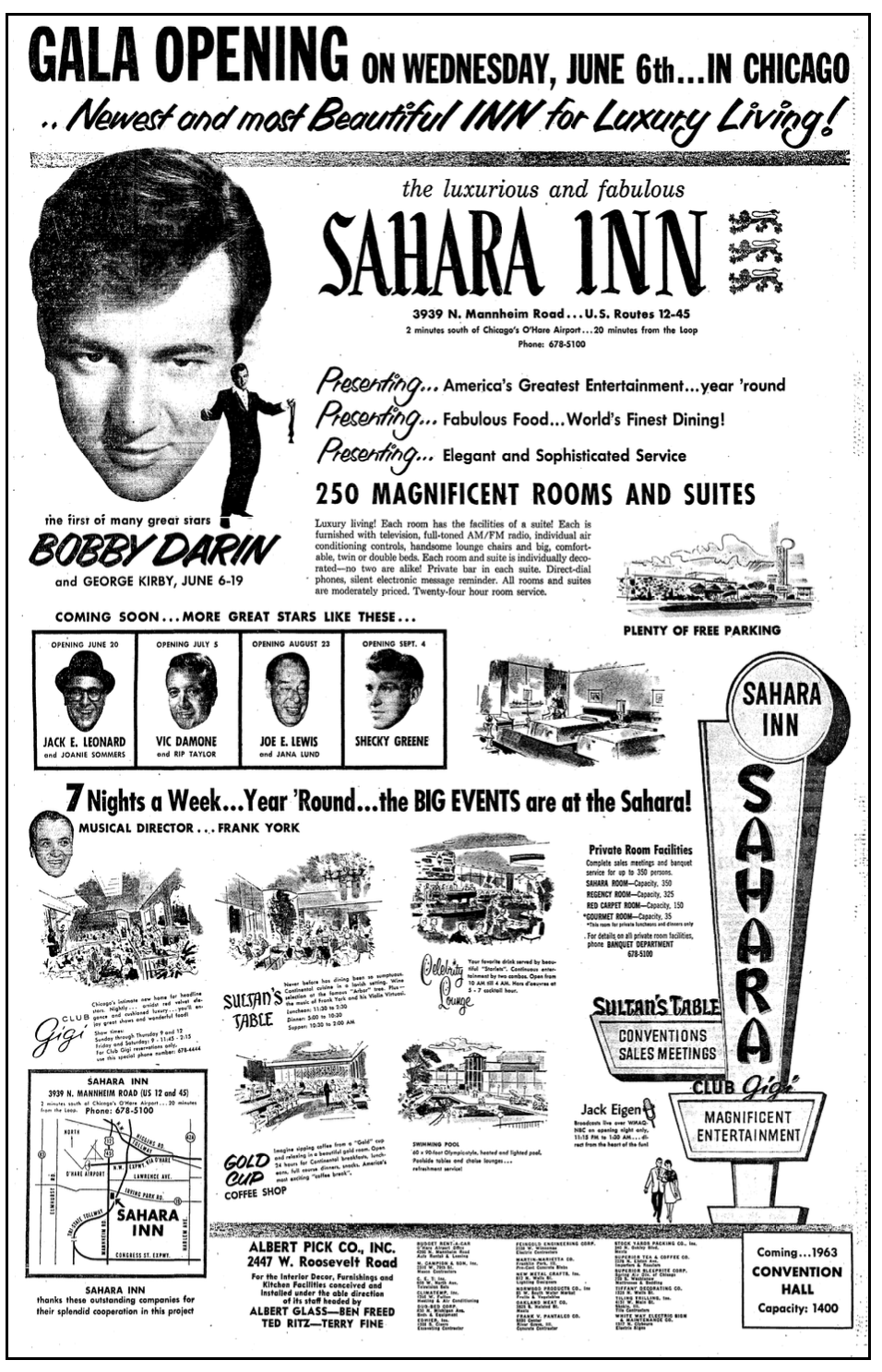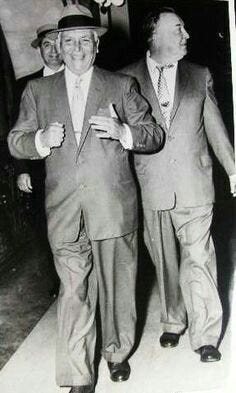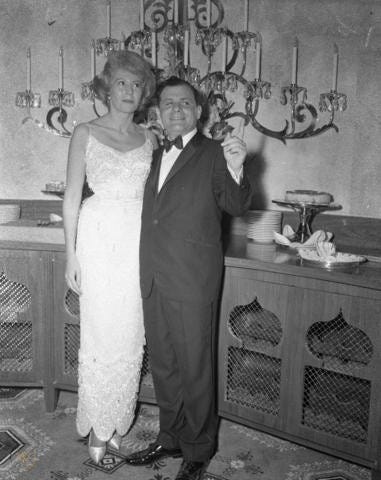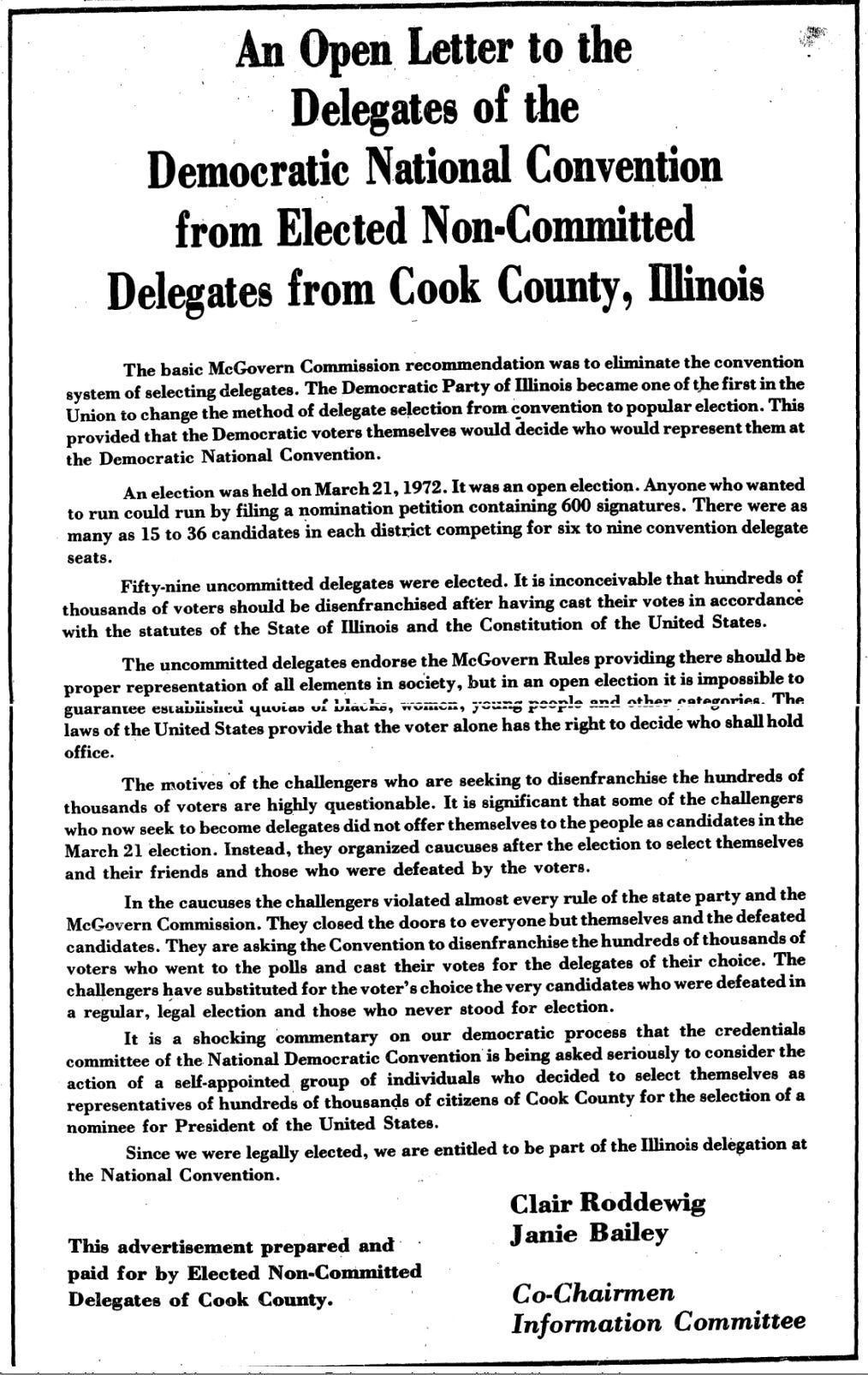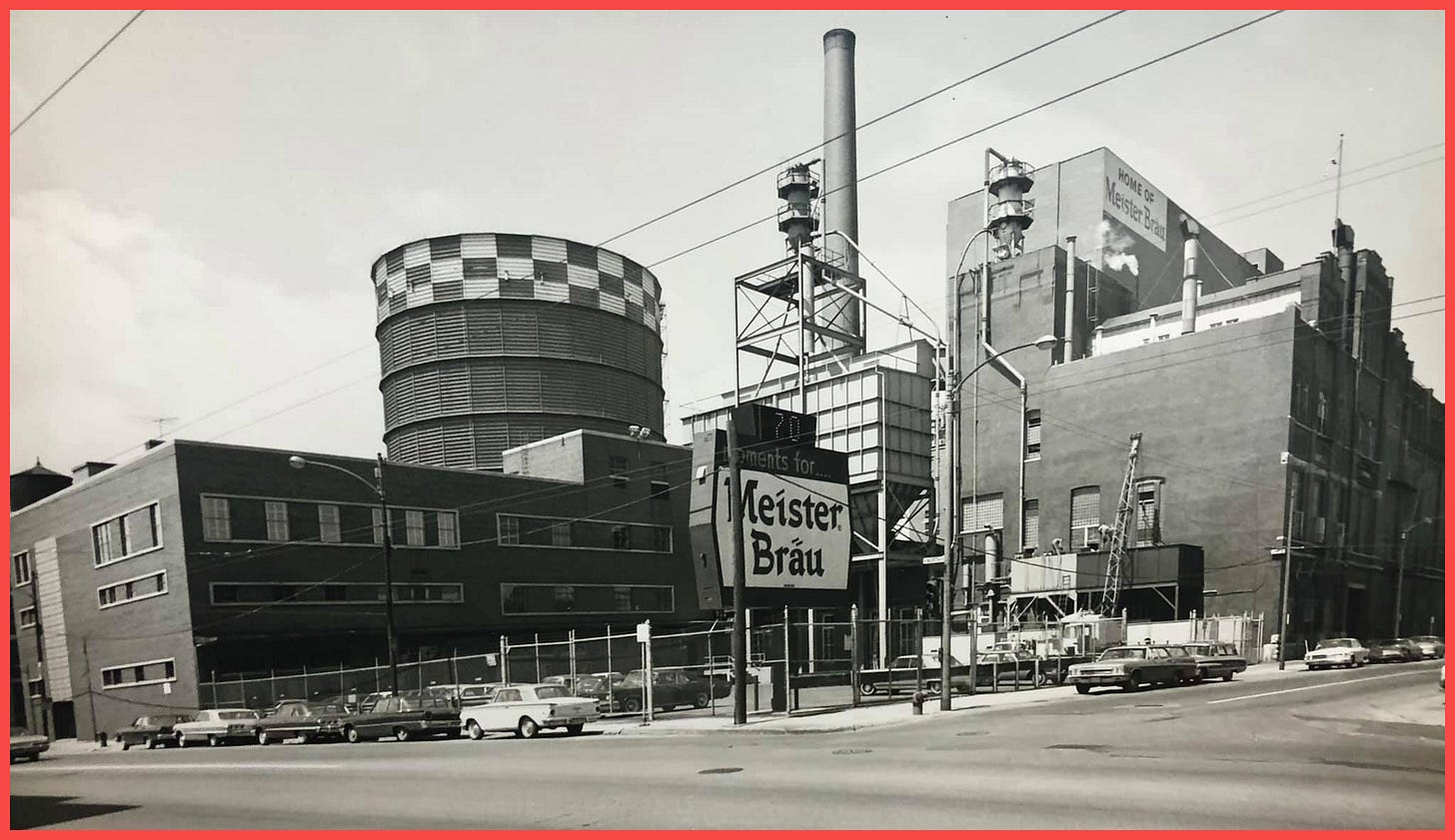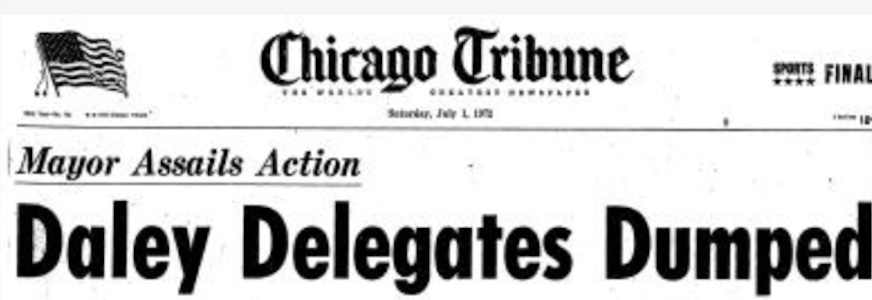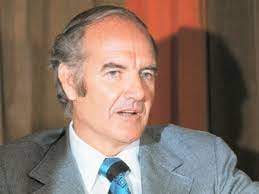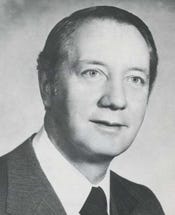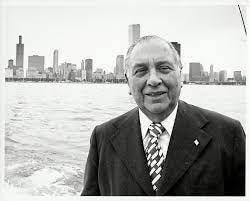To access all website contents, click HERE.
Why do we run this separate item peeking into newspapers from 1972? Because 1972 is part of the ancient times when everybody read a paper. Everybody, everybody, everybody. Even kids. So Steve Bertolucci, the 10-year-old hero of the novel serialized at this Substack, read the paper too—sometimes just to have something to do. These are some of the stories he read. Follow THIS CRAZY DAY on Twitter, @RoselandChi1972.
June 26, 1972
Last week, the papers revealed that the FBI thinks there’s a “hit squad” of Black police officers mixed up in narcotics trafficking. (See here for more on June 20, 21, 22 and 25.) The “hit squad” has allegedly murdered six to seven Black men gangland-style since last fall—shot in the back of head and dumped in the south branch of the Chicago River or the Sanitary and Ship Canal.
Police Supt. James Conlisk was already on thin ice. There are at least ten cops indicted in another FBI investigation of shake-downs for protection money in the Austin police district.
U.S. Representative Ralph Metcalfe has been leading a full-throttle attack on police brutality in the Black community since May, calling for five reforms including a civilian police review board.
Today, Daily News City Hall reporter Jay McMullen reports that Mayor Daley says, “I’m 100 per cent behind the superintendent, until the day I tell you the superintendent has asked to be relieved.”
“‘Has Conlisk done anything wrong?’ Daley asked during a City Hall press conference.
“‘Is he involved in leaking information by the federal people, which is unbelievable, dastardly, foul and deceitful? Would you like to be mentioned as a murderer without being indicted?”
“‘Did Conlisk have anything to do with the murders?’”
Mayor Daley means the police “hit squad” murders. The information was leaked by somebody, since there are still no indictments or arrests in the case.
Daley says that former Supt. Orlando Wilson, brought in from out-of-town to reform the department after the disastrous 1960 Summerdale Scandal, recommended Conlisk as his successor “after a six-year apprenticeship”.
Don’t miss Mayor Daley as King Kong at the very end, per Chicago Today.
Chicago Daily News
by Barry Felcher and Edmund J. Rooney
Meanwhile, Conlisk suspended police sergeant Stanley Robinson as part of the police “hit squad” investigation—and now he’s vanished.
Police officials say three of the four suspected “hit squad” cops have been co-operating in the investigation, but they wouldn’t name them. Robinson is the first and only suspect named so far. Conlisk says Robinson took a lie detector test that was “inconclusive.”
“However, he reportedly refused to co-operate with the police Internal Affairs Division and the police Intelligence Division” in the police investigation of the FBI investigation.
Chicago police are investigating parallel to the FBI, since Conlisk says the FBI “provided the Chicago Police Department with these allegations, but they refuse to say where they got their information.”
Robinson joined the department in 1961, served with the Gang Intelligence Unit, he’s gotten seven commendations for meritorious service, and he made sergeant in 1970.
June 26, 1972
Martha Mitchell is back on Chicago front pages, even with a police hit squad on the loose and Mayor Daley fighting a political bloodbath with the likely presidential nominee of the Democratic Party.
And note one of the articles touted at the bottom of the page—the first I’ve seen in any of the papers focusing on gay issues.
But back to Martha. When we left her last week on June 23 at a Newport Beach hotel talking to UPI reporter Helen Thomas about how unhappy she is with political life, suddenly the line went dead.
Now, the AP reports:“Martha Mitchell, the fast-talking wife of former Atty. Gen. John N. Mitchell, has taken up residence at the Westchester Country Club” after “what she described as a dispute with her personal security guards.”
Recall that John Mitchell resigned as Attorney General to run the Committee to Re-Elect the President for Nixon (CRP, aka CREEP).
This time, Martha talked to New York Post reporter Marcia Kramer, while chain-smoking and pacing the room “nervously” throughout the interview. Mitchell says a Nixon campaign committee security guard pulled the phone cord out of the wall in her hotel bedroom as she talked to Helen Thomas.
“‘I just couldn’t take it anymore,’ she said, contending also that several guards threw her on a bed and ‘stuck a needle in my behind.’”
Martha repeats: She’s leaving John Mitchell unless he quits politics.
The allegations of being drugged and kept from communicating with others is toward the end of the story, and covered by a pun for the headline. There’s no mention of anyone looking into the allegation that Martha Mitchell was drugged and kidnapped, or whatever you want to call it. Or that somebody should look into it.
There’ll be no more Watergate news this week, unless you count a couple of articles end of week reporting that that Democratic officials are really freaked out about it as they finish preparing for the upcoming Miami convention.
June 26, 1972
Chicago Today
by Molly Cole
Chicago Today’s Molly Cole tells readers how to get information before there was even an Ask Jeeves.
Younger Readers, you won’t believe it: Instead of googling something, the best you could do in 1972 is make a phone call and listen to a pre-recorded message. You may not know about Jeeves either, but you can see it was an early form of googling.
“Who receives an average of 50,000 to 60,000 calls a day? President Nixon? Dustin Hoffman? No, the weather lady. WE4-1212 is truly the hot line of Chicago.”
Funny that Molly Cole would think to link Dustin Hoffman and President Nixon when the Watergate cover-up has barely started, and no one could figure on a movie starring Dustin Hoffman and Robert Redford. Perhaps she’s thinking about Dustin Hoffman because they’ve brought 1967’s “The Graduate” back into theaters for an encore.
The weather phone line gets up to 200,000 calls a day—the record being almost 500,000 in one 24-hour period.
“The weather lady isn’t just any old run of the board telephone operator. She’s a directory assistance operator selected because she has a good speaking voice.” Ten telephone operators read and record National Weather Service forecasts as they come off a “teletype,” 24 hours a day.
Checking the time is also quite popular, since people can’t just look at their phone for an accurate read. People “call Time” to set their clocks and watches.
Others:
Dial 325-2100 if you’re trying to give up smoking, for information and moral support from the Hinsdale Sanitarium and Hospital. There are no smokeless e-cigarettes or even Nicotine gum, I don’t think, in 1972.
Call 225-9258 to hear answers to various questions on venereal disease from the Chicago Board of Health.
For latest stock market results, call WE9-1600.
Latest sports scores are provided by Chicago Today/Chicago Tribune at 222-1234.
Those phone numbers are all complete, BTW. Chicago and all the suburbs were 312—so you didn’t have to dial it.
June 27, 1972
Chicago Daily News: Letter to the editor
The headlined letter responds to a previous letter printed on June 21, “The real fears of Chicago whites.”
June 27, 1972
Chicago Daily Defender
June 27, 1972
Chicago Daily News
Mayor Daley loses another round in the ongoing battle over his slate of 59 delegates to the Democratic National Convention, elected in the recent primary. Independent Democrats led by Ald. Bill Singer and Rev. Jesse Jackson claim the Daley bloc violates the party’s new rules on electing delegates, and should be thrown out and replaced with a slate of their challengers, chosen at meetings last week. (See June 23 for that crazy story.)
The latest loss: Democratic Party hearing officer Cecil Poole, a former U.S Attorney who held hearings on the challenge in late May/early June, files a report with the Democratic National Convention’s credentials committee supporting Singer and Jackson. (See June 2 for a look at those hearings, see June 23 for Daley loyalists breaking up Singer-Jackson meetings to pick an alternate slate of delegates, and see Mike Royko 50 Years Ago Today on June 26 for a look at Richard M. Daley leading one of those meeting raids.)
Poole “upheld all charges by challengers” that Daley’s people violated the party’s new reform rules for electing delegates—and says it was “deliberate, covert and calculated.”
Mayor Daley’s regular Democratic organization broke the rules by making and backing a slate of candidates, writes Poole, and the resulting delegates don’t meet the new requirements for representation of women, Blacks, young people, and other minorities.
Poole ruled that Daley’s 59 delegates were “selected outside the arena of public participation” since throughout the eight congressional districts involved, no state or local Democratic organization publicized how delegates would be slated.
Next, it’s up to the Democratic National Convention’s Credentials Committee, which will be using Poole’s report to make a decision. Daley’s people filed judicial challenges, but ultimately the U.S. Court of Appeals ruled the Credentials Committee should tackle this question before the courts.
Ald. Singer says it’s impossible for the Credentials Committee to seat the Daley 59.
“The national party cannot condone the evils inherent in the rule violations,” said Singer. He hopes the alternative slate elected by the challengers last week will get seated at the upcoming national convention in Miami.
Mayor Daley does not agree.
“Poole overlooked the fact that delegates were elected by 900,000 people,” Mayor Daley said at a City Hall press conference.
Probably a more emphatic verb than “said” would make sense, but the papers only use more descriptive terms for Mayor Daley when he completely blows his top. Even then, they just use periods rather than exclamation points.
“You’re not going to substitute those people (the alternative slate) for delegates elected by 900,000 people,” he said.
Daley contends there were up to 36 candidates running for delegate positions in each congressional district for the primary election, so clearly there was plenty of opportunity to participate.
As for minority and female representation, “Daley said that ‘the quota system is never applicable when you have open and free elections.’”
June 27, 1972
Chicago Daily News
by Edmund J. Rooney
“Police and fire department boats and helicopters Tuesday searched the south branch of the Sanitary and Ship Canal in the possibility that the body of missing police Sgt. Stanley Robinson might be found.”
That’s where the six executed victims in the alleged police “hit squad” murders were found.
Robinson was due at police headquarters at 11th and State for more questioning on the “hit squad” murders, and never showed up—so he’s already been suspended. He’s vanished “for more than 24 hours from his $185-a-month South Side apartment at 2316 E. 70th Pl., where he lived with his wife, Aileen, and their two daughters, Tanny, 11, and Trina, 13.”
Robinson left home at 1 a.m. Monday morning without saying where he was going. John Killackey, chief of the police department’s Criminal Investigation Division, tells the Daily News that “an anonymous phone caller…phoned police headquarters at 5:17 a.m. Monday to report a ‘kidnaping’ on the West Side.” A half hour later, the same man called back reporting a different location for the kidnapping—Fifth Av. and Millard—and said “four black men had forced Robinson into a 1971 Oldsmobile and sped off.”

At Fifth Ave. and Millard, police found “an abandoned 1967 Buick LeSabre bearing Florida license plates,” a car Robinson was using. Various papers belonging to Robinson were found in the car, including some items stained with blood.

“Federal investigators said Robinson was a close friend of Ald. Fred Hubbard (2d)”. Hubbard disappeared in May when $100,000 was found missing from the federally-funded program he ran, and after Hubbard had made several losing trips to Las Vegas casinos.
Some cops think Robinson’s apparent kidnapping is a hoax, others think it’s true because there was evidence of a struggle in the car.
June 27, 1972
Chicago Daily Defender: Victims lay bare cop harassment
by Robert McClory
“With FBI and Justice Department officials in attendance, U.S. Rep. Ralph Metcalfe (D-1) Monday began an organized attempt to throw first-hand light on the city’s law enforcement system, which the congressman called ‘rotten to the core,’” writes Robert McClory.
Metcalfe was a lifetime Machine loyalist until late April, when he broke with the Machine over the issue of police brutality in the Black community and presented six demands to Police Supt. James Conlisk, including a civilian police review board. (One demand was a deadline that has passed, so it’s down to five demands now.) In early May, Metcalfe and Daley held dueling public meetings to discuss police brutality, and refused to attend the other one’s meeting.
Though it’s not mentioned here, Metcalfe was spurred by the arrest experience in March of his friend, Dr. Herbert Odom, who will testify on the 27th. For more background, see especially May 2, 3, and 6-7.
Metcalfe now heads the Concerned Citizens Committee for Police Reforms, which continues to press its demands—plus calling for Mayor Daley to come to the Black community to discuss police brutality. But Daley has ignored Metcalfe, so Metcalfe organized these hearings himself to interview witnesses.
“As case after case of blood, beatings, and brutality was presented to the blue ribbon committee selected by Metcalfe, the spectators who overflowed the courtroom in the Dirksen Federal Building, 219 S. Dearborn, listened in grim silence."
“Only once did they break into cheers. When Metcalfe asked a woman, whose pregnant daughter had been beaten by police, what Chicago needs most, she replied, ‘Most of all, we need a police force.’ The spectators obviously agreed.”
Metcalfe told reporters the blue ribbon committee, which will hear testimony through July 5, will make recommendations. “But many representatives of Metcalfe’s Concerned Citizens for Police Reforms hope for a full scale federal probe of the Chicago Police Department as a result of the hearing’s disclosures.”
Kermit Coleman of the ACLU is questioning the witnesses. “Committee members include attorney E. Duke McNeil, of The Woodlawn Organization; Andrew C. Barnett, executive director of the Chicago NAACP; Lenora Cartwright, of the League of Black Women; Russ Meek, director of A Search for Truth, Inc. and the Rev. Clay Evans, pastor of Friendship Baptist Church.”
June 27, 1972
(UPI)
Chicago loses the Golden Jet!
“Superstar Bobby Hull of the Chicago Black Hawks jumped to the new World Hockey Assn. Tuesday by signing the first of two contracts that total $2.5 to $3 million.”
Hull, 33, starts off signing a $1 million contract with the WHA for marketing, and he’ll fly to Winnipeg next to sign a 10-year $1.5 million deal with the Jets.
That’s about $17 million to about $20 million in 2022 money—but half of it is over 10 years. That’s great compared to other athletes at that time—remember, it’s a huge deal in 1972 that Dick Allen is the first White Sox to make just over $100,000.
That’s surprising because Hull’s huge payday is incredibly light compared to what baseball, football and many basketball players make these days. According to CapFriendly’s history of Wayne Gretzky’s contracts, even the Great One’s highest one-year salary was just $6,545,400 in 1995-96.
According to AZ Central, “34 NFL players now make at least $20 million a season in average annual salary, according to overthecap.com, a site that tracks NFL player contracts (though Sept. 10, 2021).” But that’s the average. Kansas City Chiefs quarterback Patrick Mahomes makes an average of $45 million per season.
Per sportscasting.com, the highest paid NHL player in 2022 was Connor McDavid of the Edmonton Oilers, who’s making $16 million this year. It mentions a Forbes article that found the average hockey player making about $2 million in 2015-2016.
In 1972, Bobby Hull is the second highest scorer in NHL history. Now, he’s 17th, and his memory almost entirely eclipsed by the Great One.
But for 1972 Chicago, this was somewhat similar to the Bulls losing Michael Jordan—certainly it was to Black Hawk fans.
“It was a shock,” says Steve. “That he would go to the WHA. But a lot of players started doing it. But he was the most significant. Gordie Howe jumped too, but he was pretty old at the time. It was just a shock though, y’know? I mean in ‘71 the Hawks lost in the seventh game of the Stanley Cup, and then you lose your best guy. Even though that team loaded with stars. Tony Esposito! Bill White! Pat Stapleton! Dennis Hull! Stan Mikita! Lou Angotti! Doug Jarrett! Cliff Koroll! Keith Magnuson! Chico Maki! Pit Martin! Jimmy Pappin! Eric Nesterenko!” I had to tell him to stop. “That was just a stud line-up,” he added. “They were all Canadians except Stan Mikita.”
June 28, 1972
Chicago Daily News: full page ad
On May 8, we saw two full-page ads for proto-ATM machines, one from LaSalle Bank and one from Pullman Bank. Now Uptown Federal is getting in the act—and beating 21st century tech companies by at least 40 years in giving their machine a friendly female name: Ernestine.
Younger Readers will be shocked that people used to literally be unable to get money except from an actual bank, during bank hours.
These early cash machines are just one-offs though—there are no networks of cash machines. To use Ernestine, you have to go to Uptown Federal Savings at 430 N. Michigan.
Are you wondering about 430 N. Michigan? In 2022, it’s the same building as in 1972, now known as the Realtor Building. It was built in 1963 and replaced one of the narrowest skyscrapers ever built, per the Chicagology website—13 stories tall and only 25 feet deep.
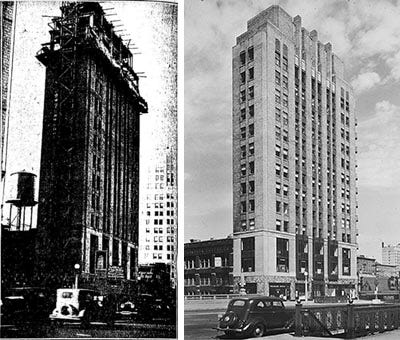
Here’s 430 N. Michigan today, still right next door to the Wrigley Building, but nearly unrecognizable after a facelift. You don’t recognize it?
Does this look more familiar?
How about now?
Yes, psychologist Bob Hartley could stop and get some cash from Ernestine any time he went to the office.
If you’re a regular THIS CRAZY DAY reader, you’ll probably want to follow Mike Royko 50 Years Ago Today too.
June 28, 1972
Chicago Daily News
by Charles Nicodemus
The “scathing indictment” of Democratic Party hearing officer Cecil Poole’s report on Mayor Daley’s 59 elected delegates to the national convention has “pushed both sides further apart, dashing any hopes of a quick compromise,” writes Daily News political editor Charles Nicodemus.
Likely nominee U.S. Sen. George McGovern supports the Singer-Jackson challengers, so it’s really down to Daley versus McGovern.
Right now it’s up to the Democratic National Convention’s credentials committee, which is in the middle of deciding a whole passel of thorny similar challenges. But the Chicago one is the worst. It involves Mayor Daley.
Ald. Bill Singer, who leads the Chicago challengers with Rev. Jesse Jackson, says if the credentials committee doesn’t throw out the Daley delegates and seat the challenger’s slate, it “would wreck the party’s widely publicized reform movement.”
Asked if he would consider compromising, Mayor Daley said, “Compromise on what?”
Ald. Tom Keane, one of the lawyers for Daley’s slate of delegates, already sued to stop this challenge, but the U.S. Court of Appeals said the Daley delegates should try to work it out with the credentials committee first. Keane says if the committee rules against Daley, they’ll go back to court.
Frank Mankiewicz, Sen. George McGovern’s “chief political operative,” says he hopes they can find a compromise before the credentials committee gets to this challenge, probably on Friday.
Two wrinkles to consider: The Daley delegates are mostly uncommitted, because Mayor Daley likes to go to national conventions as a power broker. The Singer-Jackson delegates are mostly for McGovern.
Buuuut—Mayor Daley’s people warn that if he gets kicked out of the convention, Democrats won’t win in Illinois.
June 28, 1972
Chicago Daily News
Daily News readers want to know what Mike Royko thinks about the war over Chicago’s delegates to the Democratic National Convention. Mike tells them today—see “Mike Royko 50 Years Ago Today” to see Mike’s take, posting in a day or two after this. Subscribe for FREE and get it in your email box!
June 28, 1972
Chicago Daily Defender: full page ad
Wait, what? Debbie Reynolds?? With Mayor Daley at 47th and Halsted?
Got to wonder if some 1972 heads exploded over that one.
June 28, 1972
Chicago Daily News
by Lu Palmer
U.S. Rep. Ralph Metcalfe’s hearings on police brutality continue in the Dirksen Federal Building with three witnesses, including Dr. Herbert Odom, a dentist who is friends with Metcalfe. It was Odom’s experience on March 13 that spurred Metcalfe’s crusade against police brutality in the Black community, and made him break with the Democratic Machine after a lifetime career working for it.
“Dr. Herbert D. Odom, a dentist, of 5201 S. Cornell, testified that he was abusively stopped and searched by two policemen last March 13 as he drove near 59th St. and S. Union,” writes Lu Palmer.
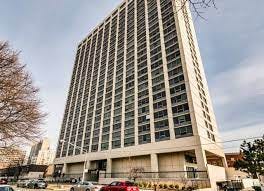
“Odom said he was handcuffed, searched on the street and then pushed into a squad car and taken to a police station, where he was charged with striking an officer and disorderly conduct.”
June 28, 1972
Chicago Daily News: full page ad
Meister Brau, Chicago’s hometown beer—the only one still brewed in Chicago!
June 28, 1972
Chicago Tribune
by Lynn Taylor
Meister Brau, the only beer still brewed in Chicago, is “having discussions” with Miller Brewing, a subsidiary of Philip Morris, Inc., which is the sixth largest brewer in the country.
“Altho neither Miller nor Meister Brau would disclose details…spokesmen for both companies acknowledged that some negotiating was involved.”
The move would make sense for Miller, with Chicago sales that “have not been good”—while “Meister Brau is very strong here.”
Meister Brau has been shedding unprofitable operations like its Burgermeister subsidiary and a candy company, Kanda, which it bought just two years ago. “Meister Brau has not issued final figures for 1971. However, in April the company said it would report an estimated net loss of $1,184,000 compared with a net loss of $1,991,000 in 1970.”
June 29, 1972: Ald. Marzullo and the CTA
Three versions of a City Council hearing on CTA safety—not sure if the Sun-Times missed this or I missed seeing it when I flipped through the issue on microfilm.
Watch for Ald. Vito Marzullo’s quote to change between stories, but it only gets better, so who cares which one is right.

Chicago Today
by David Ross
“James Kulis should know something about the lack of security on the Chicago Transit Authority’s rapid transit,” opens Today’s David Ross.
“The part-time CTA ticket agent has been attacked twice while operating CTA ticket booths and last May his brother, Michael, a 20-year-old Loyola University student, was murdered while riding a CTA train.”
James Kulis testified before the City Council’s transportation committee during a hearing on CTA safety.
“‘If this committee was really interested in security, they would ride the CTA at night to find out there really is no security,’ he said, to which Ald. Vito Marzullo (25th), the committee’s chairman, replied,
“‘We’re not going to ride the CTA. We’re not crazy.’”
Ald. Seymour Simon spurred these hearings with a resolution—he’d like to see a full-time CTA security force, rather than relying on the Chicago police transit unit. The CTA would rather not.
“(Police) First Deputy Supt. James Rochford said he feels ‘confident with our present security.’”
Rochford also claims total CTA crime is down “slightly” so far this year compared with 1971. “Alderman,I urge that Chicago police not be replaced,” he says.
CTA Chairman Michael Cafferty sent an underling to read a statement that also supported keeping Chicago police. Regarding the death of Kulis’ brother, Cafferty’s statement said that such a tragedy “commands so much publicity that it conveys an impression of an extent of criminal activity not consistent with the facts.”
Chicago Daily News
by Jay McMullen
Besides giving us an even funnier quote from Ald. Marzullo, Jay McMullen notes that First Deputy Supt. Rochford admitted under some questioning that the number of cops who patrol the CTA on a daily basis is only 160, what with scheduling and days off for the 254 cops assigned.
“I’m beginning to think that to get real safety on the CTA, we have to have a uniformed patrolman on every train and every platform,” said Ald. Simon.
James Kulis, brother of murdered 20-year-old Loyola student Michael Kulis, “charged that most officers assigned to patrol the CTA are kept in Loop stations as a ‘public relations gimmick,’ while most outlying stations are without protection after 7 p.m.
“All of you aldermen should take a ride if you think there’s security on the CTA,’ Kulis declared.
“‘We’re not going to ride the CTA,’ replied Ald. Vito Marzullo (25th), committee chairman. “‘I’m not going to get myself killed.’”
Chicago Tribune
by Edward Schreiber
The Trib’s Schreiber gives us a bit more from James Kulis, and his mother, Mrs. Rose Kulis.
James Kulis tells aldermen that during his four years as a ticket agent, he “‘had guns and knives pulled on me.’ He said prostitutes solicited without being restrained by police at some North Side stations”.
Surprisingly, the Tribune is the first to give us the Kulis’ address, 1500 58th Ave., Cicero.
And get this:
“He said Chicago policemen assigned to the transit detail once plugged a [turnstyle] with bottle caps so they could extract the quarters, which they brought to him to convert into dollar bills.”
Astoundingly, Schreiber gives us a more detailed quote from James Kulis’ challenge to aldermen to ride the CTA—but misses Ald. Marzullo’s response.
The quote:
“You aldermen should ride the CTA, particularly on Saturday night until 2 a.m. I talked to agents and other CTA employees to ask them to testify here today. They said they can’t, that their jobs would be in jeopardy.”
June 29, 1972
Chicago Daily News: Letter to the editor
Kathleen Powell timed her letter, or assault, very well indeed.
June 29, 1972
Chicago Daily News
by Robert Schener
A 16-year-old has been arrested for allegedly murdering 16-year-old Kathleen Fiene last week as she walked home from a baseball game in her Brighton Park neighborhood.
Fiene was shot a block away from her home at 5752 S. Paulina. (See June 21 and 22 for more.)
“The suspect was named as the gunman by a Freeport youth being held as the ‘laughing killer’ in another shooting.”
The ‘laughing killer’ shot Mrs. Melba Winston six times. Winston was a waitress walking home after work to her home at 5610 S. Justine, just a few blocks away and a two days after Kathleen Fiene’s murder. The killer laughed during the entire attack.
“Police called the shooting of Miss Fiene a ‘racial’ matter. She was white and the youth arrested is black.
“Police said Miss Fiene was shot after the youths drove from a street gang disturbance that occurred in the area shortly before the slaying. Miss Fiene was shot twice in the back, once in the head and once in the right side.”
June 29, 1972
Chicago Daily News
You’re going to want these.
If you’re a regular THIS CRAZY DAY reader, you’ll probably want to follow Mike Royko 50 Years Ago Today too.
June 29, 1972
Chicago Today
Remember the guy who got on a St.Louis plane with a trombone case last week, then pulled out a submachine gun and hijacked the flight? See June 25 for full ridiculous details. He demanded and got $502,000 and five parachutes.
He only used one parachute to jump out of the plane finally over northern Indiana, near Peru, after asking the crew how to put on the parachute, and how to use it.
Although hundreds have been scouring the area for him, experts have predicted for days that nobody could survive the jump—including the pilot, who said he accelerated to 300 m.p.h. on purpose as the skyjacker jumped.
But survive he did, though he lost his grip on the bag of cash as he jumped. That was found by itself in a soybean field by a farmer.
“He is Martin J. McNally, an unemployed former gas station attendant who was recently divorced,” writes Today. He was arrested near his family’s home in the Detroit suburb of Wyandotte.
“When contacted by the authorities, members of the McNally family burst into tears and one sister exclaimed:
“‘Oh no! Marty’s in trouble again!’”
A high school dropout, he joined the Navy at 16 and served until 1964.
Chicago Daily News
But it’s the Daily News account that tells us how McNally was first identified:
“Only hours after the perilous leap last Saturday, an Indiana police chief encountered a man walking along a country road. The man carried a driver’s license issued to McNally’s brother and was released because he did not fit the description of the hijacker.”
It was unlucky Peru Police Chief Richard Blair who ran into McNally.
“Blair said the man told him he had been beaten up by his brother and kicked out of the house, and he was trying to find his way home.
“Blair said he gave the man a ride into town and notified the FBI of the incident the next morning.”
Are you here for 1972 news and wondering why this website is called “Roseland, Chicago: 1972”? Because the heart of this site is a novel by that name, being serialized chapter by chapter. Try Chapter One some time!
June 30, 1972
Chicago Daily News
Chicago Tribune
“Roman Catholic Church officials here have ordered the cancellation of a requiem mass scheduled Saturday for Rocco DeStefano, 59, a Capone-era mobster,” writes the Daily News.
“‘The scheduling of a mass here for Mr. DeStefano was a mistake,’ said the Rev. Thomas Doyle, O.P., associate pastor of St. Vincent Ferrer Catholic Church, 1530 Jackson, River Forest.
“Our requiem for 10 a.m. Saturday is cancelled in accordance with a policy of the Catholic archdiocese in Chicago that requiem masses will not be offered for hoodlums of notorious reputation,’ Father Doyle said.”
“We don’t want it here,” Father Doyle told the Tribune. “We’d have every hoodlum and policeman in the country here if we held it.”
“Father Doyle said that under canon law parishes are given the option to refuse a service for certain persons. ‘When a person who is a noteworthy gangland figure and a Roman Catholic dies it is the policy of the archdiocese that a normal funeral service not be conducted…If we had been on the ball none of this would have happened.’”
“Federal investigators said that DeStefano in recent years had acted as a silent financier for various hoodlum enterprises,” says the Daily News.
“In 1963 Chicago Police Capt. William J. Duffy, an area mob expert, identified DeStefano as a well-known mobster before a special U.S. Senate committee headed by Sen. John McClelland (D-Ark.).”
The Tribune adds that DeStefano “allegedly was a friend of Ralph (Bottles) Capone, brother of Al Capone and late crime syndicate leader, and had been involved in motel and vending machine business in Florida and Chicago. In 1965 he was a suspect in the gang-style slaying of Mandel (Manny) Skar, motel owner and syndicate figure.”
“DeStefano, 2912 N. Commonwealth, died apparently of a heart attack in New York City where he was visiting Tuesday.”
The wake was still scheduled at Galewood Funeral Chapel, 1857 N. Harlem.
Manny Skar and his murder is the best part of the DeStefano story. Manny Skar has a great video on YouTube by “Street Stories,” a YouTube channel about the Chicago Outfit, where the host remembers Manny Skar’s story from going through a cool matchbook collection. It’s well worth it for the matchbooks alone.
The Riverside-Brookfield Landmark has a remarkably detailed 5-part series on Manny Skar’s Sahara Inn North and Sahara Inn South here, with great illustrations.
It’s a tangled tale, but basically, Manny Skar got into bed financially with Rocco DeStefano and variously his brothers, Frank and Vito, in several projects. Especially, and lastly, the Sahara Inn motels, North and South.
DeStefano was a legit mobster, formerly associated with Al Capone. Skar had his own little felony convictions from the 40s and 1952 for “whisky theft on the south side,” burglary, and mail fraud.
The Saraha Inn South came first, near Midway. Any South Sider surely remembers driving by it, either when it was new and glitzy—often compared to a bit of Vegas in Chicago—
—or later, pathetic and run down. Now it’s just a boring rehab, named the Cicero Hotel.
As the $10 million Saraha Inn North was about to open in 1962 at 3939 N. Mannheim Road, just south of Irving Park in Schiller Park, state officials ordered an investigation into Sahara Inn North’s ownership, since if anybody with a felony conviction had over a 5% interest, that would bar any state liquor license.
The Sahara Inn North was two weeks from opening in June 1962, expecting “Hollywood television and movie figures” for a big to-do when that bit of news hit the papers. The Tribune mentioned that “Skar, who formed the Sahara Motel corporation with Rocco DeStefano in 1959, also operates a smaller motel at 4501 S. Cicero Av.”
Yet a Trib article about a week later reports that both North and South had just gotten local liquor licenses, under the name of the Park Inn, Inc., which claimed to operate both motels under a lease arrangement with Skar. South had even gotten its state liquor license already, while North had applied for it.
The “star-studded” opening of the Sahara North and its nightclub, Club Gigi, was days away as the Illinois Liquor Control Commission decided to investigate whether both places were “fronts” for Skar, who was completely upfront about owning both places.
And by the way, they weren’t kidding about the “star-studded” designation.
So they really meant, was Skar a front for mobsters? He was, after all, previously known as a small-time burglar before he suddenly turned up owning a $10 million new motel—which is almost $100 million in 2022 money. The Sahara South, as it became known, was built in 1959 for $2.5 million, so it was nothing to sneeze at either—that’s $25 million in 2022 money.
The Sahara North had seven bars, Club Gigi, several dining rooms, 267 rooms, and a pool. Today, it appears to have been replaced with a Hampton Inn.
The investigation revealed Skar attended at least weekly meetings “in a favorite downtown hoodlum gathering place with other top syndicate bosses and lieutenants,” such as “Rocco DeGrazio, one time crime syndicate chieftain, gambling boss, and a landlord of the Casa Madrid, long time and notorious Melrose Park gambling den.”
Plus:
“That a net of call girls pay rents of $175 a month for apartments in several plush new buildings on the north side, buildings constructed and owned by Skar’s business partner, Rocco DeStefano, one time Capone mob member. Rents are mailed each month to DeSefano at Skar’s South Side Sahara motel, 4501 S. Cicero Ave.”
The South Side Sahara is “a gathering place police say, for race track characters and hoodlums.”
“Skar’s Cadillac convertible was seen by undercover detectives as they observed the flashy funeral in 1959 of Jake [Greasy Thumb] Guzik, gang chief and one-time top lieutenant to Capone.”
“At the 1959 World Series games in Comiskey Park, Skar occupied seats with a large party of hoodlums including DeStefano, Phil Katz, a bookmaker, and Gus Liebe, manager of Rocco Fischetti’s infamous floating crap game.”
Sahara North had its opening, but Skar defaulted on his mortgages within a year and was bought out. Skar “invaded” the motel in 1964, per the Tribune, to hold a press conference and complain that the buy-out was a lousy deal for him—while claiming he’d bought out DeStefano’s interest before Sahara North opened.
At that point, “Skar was indicted…on a charge of income evasion, allegedly committed by diverting to his own use part of the 7.6 million dollars in construction loans on the motel.”
Surprisingly, John Chuckman’s Photos on Wordpress can only offer one picture related to either Sahara Inn—a picture of a dining room “in the ‘60s,” and it’s not clear whether it’s North or South.
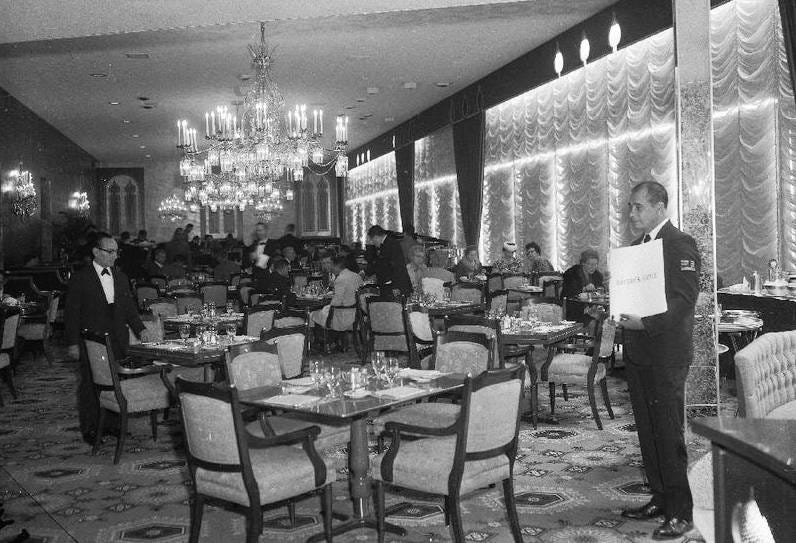
In 1965, Skar was “shot to death gangland style early Saturday morning [Sept. 11] as he was parking his car at the rear of his apartment building at 3800 N. Lake Shore dr,” per the Trib. He had dropped his wife off in front, then driven around in back to the parking garage. A parking attendant heard the shots, and found him a few feet from his car, the door open and motor still running.
Here’s a rather extraordinary extra: At the inquest into Skar’s death, his maid testified that she saw two men shoot him, from one of his 15th-floor windows.

“The fact that Miss Alice Parker, 59, of 825 E. 53rd St. was an eyewitness to the killing had been kept secret by police until her appearance yesterday,” wrote the Trib.
That’s right, they gave the home address of a witness to a mob slaying.
The Tribune’s Frances Coughlin wrote a fun article moaning about how boring Manny Skar’s funeral was compared to the big, glitzy funerals of old-time mobsters, complete with lyrics for “Dirge for a Recent Burial.”
“Manny’s funeral was as bleak as a headwaiter’s smile in a closing nightclub,” wrote Coughlin. “Nobody showed up.”
And what about Rocco DeStefano? He didn’t even get his funeral!
June 30, 1972
The cover of Chicago Today pretty well sums up the state of the fight over the Chicago delegation to the Democratic National Convention.
The Daily News is pretty dramatic too:
June 30, 1972
Chicago Daily News, Chicago Sun-Times, Chicago Today, and Chicago Tribune: full-page ad
This is a letter from Mayor Daley’s slate of delegates to the upcoming Democratic National Convention, addressed to all the other delegates to the convention. A bit confusing, since all those other delegates are from across the country and presumably not reading the Chicago daily newspapers. We can assume the real audience is Chicago voters, although they’re not on the Democratic National Convention’s Credentials Committee, so they won’t make the decision.
June 30, 1972
Chicago Today
How often does a newspaper use the lyrics of an old English sea ballad for a news headline?
How often does a newspaper story just stop you in your tracks and make you catch your breath?
The chances are better when the reporter is Jeff Lyon, but still.
“No one could find out his name,” Lyon writes for his lede. “That must have been what he wanted for he carried no identification in his blue jeans when he plunged yesterday into the river off the Adams Street bridge.
“He left but one clue. His white sailor’s cap, which didn’t quite seem to fit with his red, white and blue plaid shirt, Levis and black work boots.
“Maybe he wasn’t a merchant marine. Or an engineer in the hold of some vessel, out on shore leave.
“But somehow it isn’t enough to dismiss the young, brown-haired man as a morgue serial number. Not when hundreds of passersby watched in shock as he suddenly climbed on the bridge rail in the afternoon haze, poised briefly on the edge of forever, and let himself slide into the green water far below.
….. “Searchers with their grappling hooks, homicide investigators, no one has come up with another version, yet.
“Meanwhile, a photographer caught the scene as an unknown man’s life played out, and he caught the tear of a black girl who sensed the pain submerged.”
Unfortunately, Chicago Today is only available on microfilm, and the quality of the reproduction is poor even by microfilm standards. Often, it’s tough just to read the print—even though it’s a picture of black ink on a white background. For pictures, you’re lucky if you can manipulate the microfilm machine to even glimpse the picture onscreen, much less copy it. This story is no exception. But this picture is so tantalizing—you can just barely make out the forms of anguished faces peering over the Adams Street bridge—that I’ve included it anyway.
Like the rest of this story, we’ll have to let our imaginations fill in the blanks.
June 30, 1970
Chicago Tribune
The three remaining cops suspected of being part of the alleged police “hit squad” are sent back to work. The fourth, Sgt. Stanley Robinson, is still missing after disappearing on June 26 when an anonymous person called police headquarters and reported he’d been forced into a car at 5th Av. and Millard.
June 30, 1972
Chicago Today
by John McHugh
“At least 300 Chicagoans will be tossed out of work when Meister Brau Inc., the only remaining Chicago brewery, shuts down.
“Meister Brau, ‘Chicago’s hometown beer,’ has sold its label and other assets to Miller Brewing Co. of Milwaukee, a division of Philip Morris Inc.” And Miller has already announced it’ll close the brewery at 1000 W. North Avenue.
“Meister Brau’s departure marks the final chapter for what was once a thriving brewing industry in Chicago. In the Thirties the city boasted 50 breweries in full production.”
President James W. Howard announced the sale, saying that the board of directors concluded the company couldn’t financially keep operating its breweries. A spokesman says Meister Brau sold over 600,000 barrels per year. Miller plans to move production to Fort Worth and Milwaukee.
Meiser Brau began in 1891 when German immigrant “and American Civil War hero” Peter Hand began brewing under his own label. The company sold to the current investors in 1967 for $16 million.
Meister Brau wouldn’t let reporters enter the brewery to interview workers about losing their jobs, and a company spokesman was refreshingly honest about it:
“To be frank about it, the publicity is something we don’t want. We don’t know what somebody might say. Some of them might be upset about losing their jobs.”
July 1, 1972
by Philip Warden
“Forces for Sen. George McGovern (S.D.) succeeded tonight in getting the Democratic Convention Credentials committee to oust Mayor Daley and his 58 Cook County delegates.” The committee debate took three hours.
That means for now, Ald. Bill Singer and Rev. Jesse Jackson’s independent slate of delegates are supposed to represent Cook County at the convention. Most of Daley’s delegates were uncommitted so he could play power broker at the convention if he wins a floor fight on this issue, while 41 of Singer and Jackson’s delegates are committed to McGovern.
“The vote was originally 71 to 61, with seven abstentions. But the chair ruled the abstentions should be counted as votes for Daley, which meant that the Chicago mayor lost by only three votes.” Ouch.
According to this report, McGovern forces refused compromises proposed by Muskie, Humphrey and Henry Jackson supporters. That’s because yesterday, the credentials committee voted on a dispute over California delegates and took away 151 McGovern delegates—with the votes of five of the six Illinois (Daley) representatives on the committee.
“Otto Wendell, a Michigan member of the committee, asked Wayne Whalan, attorney for the Singer group, how many of the delegates he was proposing sought election in the Illinois primary.” Answer: 33 of the 59. Mike Almond, a member from North Carolina, asked how many Singer delegates were committed to McGovern. Answer: 41.
Almond, “who offered a compromise calling for the selection of new delegates, also decried” the Singer group: “‘We should not substitute one boss-controlled delegation for another,’ he said…. ‘There is no justice in this challenge. There is only one choice between two evils. I will not make that choice.’”
You think it’s over? It’s not over.
Daley’s forces will go back to the Federal Court of Appeals, which stayed their original lawsuit seeking to block the Singer challenge, saying the credentials committee should try to solve it first. They’ll seek to go back to Cook County Circuit Court and get an injunction against the Singer-Jackson delegation.
And—now they’re also planning to go see U.S. Supreme Court Justice William Rehnquist to stop any other legal proceedings until they can ultimately appeal to the Supreme Court, per this report.
The convention will settle outstanding delegate disputes on July 10, so there’s gonna be a floor fight.
But that’s not all!
Ald. Michael Bilandic, alderman for Daley’s 11th ward, has “threatened” that the Machine would try to get the Democratic nominee stricken from the Illinois ballot if Daley’s 59 delegates, elected during the primary, aren’t seated at the convention.
That’s not going to fly with the State Electoral Board, which has four Republican members and three Democrats. Illinois Secretary of State John Lewis, Republican, says he’d vote against that scheme, and so would the other Repubicans—Gov. Ogilvie, Attorney General William Scott, and the Republican state chairman.
Meanwhile, Jesse Jackson says it’s “not an automatic thing” that the Singer-Jackson delegates will get seated at the convention—and calls for a meeting between the two sides to come to a compromise. As if?
“The mayor has to understand that this is a new day. He has to respect people he did not respect before, because it is true that the Democratic Party is a party of the people,” says Jackson.
But he adds: “It is incumbent on Daley to request a meeting of the leadership of the challengers and his leadership” in order to produce a delegation that follows the party’s new rules. Yeah, as if.
July 1, 1972
July 1-2, 1972
Chicago Daily News: editorial
“With all the shouting it’s a bit hard to keep the Democratic Party picture in perspective just now,” writes the Daily News editorial board. “In a sense Mayor Daley invited his comeuppance when his five members of the credentials committee cast pivotal votes in the successful effort to split off 151 of the 271 delegates Sen. McGovern had won in the California winner-take-all primary.
“When it fell to the lot of the McGovern forces to turn the tables on the mayor on the issue of dislodging his 59-man uncommitted Illinois delegation in favor of a slate of McGovern-admiring challengers, they didn’t hesitate. Daley’s forces on the credentials committee were as helpless as McGovern’s had been the day before, since members are barred from voting on challenges to their own status.
“But McGovern, having had his fit of pique and his sweet revenge, cannot afford to leave it at that….The threat of Daley’s forces to scuttle McGovern’s chances of winning in Illinois is not an empty one. Whether they could rule McGovern off the ballot is moot, but if Daley opposes McGovern’s candidacy, it’s hard to imagine any circumstances in which he could carry the state.”
…. “In the next few days there will be massive efforts by fellow Democratic leaders to produce a reconciliation. There are great issues that require earnest, orderly public debate, and that can only result if the major parties go at each there full tilt. It would be a pity if the Democrats squandered their force—and whatever chance they have—in a donnybrook at Miami.”
July 2, 1972
Chicago Tribune
no byline
Sgt. Stanley Robinson staged his own kidnapping earlier this week, announces Police Supt. James B. Conlisk.
The guy who called police headquarters to report Robinson had been forced into a car at 5th Ave. and Millard by several men? Voiceprint identification proves it was Robinson on the phone.
A warrant is out for Robinson’s arrest for disorderly conduct for the kidnap hoax. Police and the feds still have no evidence directly linking Robinson and three other suspects cops with the “hit squad” murders, or if they do, they’re not making it public. The other three suspects are back at work.
July 2, 1972
July 2, 1972
Chicago Tribune
BAM.
Mayor Daley wins a round finally, and with the U.S. Supreme Court. “Justice William H. Rehnquist ruled that Daley’s forces may go into Cook County Circuit Court to attempt to bar the Singer Group from the convention.”
That hearing is set for next Wednesday.
July 2, 1972
Chicago Today: editorial
“As Mayor Daley’s forces go on losing battle after battle in their drive to assert power over the Democratic national convention, it may occur to them to wonder if they’re using the wrong tactics. On the other hand, it may not. No defeat they’ve suffered so far has shaken their confidence that Mr. Daley can’t be beaten. In fact they seem to think he is so supernaturally powerful that he can deny 10 million Illinoisans the vote if he feels like it.”
Daley’s side had a good argument, says Chicago Today—their delegates were elected by popular vote. But they “relied on tactics that have so often served them well at home: Threats and pressure. They let it be known that, if Daley didn’t have his way, he wouldn’t support the Presidential nominee in November, so the poor fellow couldn’t win.
“When this didn’t work, they tried an absolutely stupifying move: A warning that, if Daley’s delegates were unseated, he would file suit to keep the Democratic presidential nominee off the ballot in Illinois—a threat that may not have been equaled for presumptuous arrogance since George III.
“Now that this too has failed, Daley’s supporters will have to think of something really spectacular. Maybe they could ask the mayor to climb the Empire State Building and swat down a few airplanes.”
Did you dig spending time in 1972? If you came to THIS CRAZY DAY IN 1972 from social media, you may not know it’s part of the novel being serialized here, one chapter per month: “Roseland, Chicago: 1972” —FREE. It’s the story of Steve Bertolucci, 10-year-old Roselander in 1972, and what becomes of him. Check it out here.



